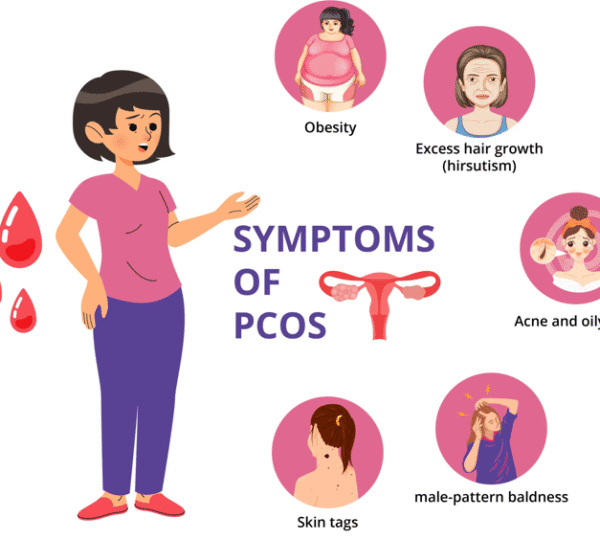
PCOS Reality Check: Symptoms, Remedies, Stories
Have you ever wondered why some women battle stubborn acne, unpredictable periods, or sudden weight gain that doesn’t make sense? For many, the answer is Polycystic Ovary Syndrome (PCOS).
Polycystic Ovary Syndrome is one of the most common health conditions affecting women of reproductive age, yet it’s also one of the most misunderstood. Many girls don’t get diagnosed until their late teens or even adulthood. Why? Because its symptoms often look like “normal teenage changes” or everyday stress.
This blog is a reality check. We’ll break down Polycystic Ovary Syndrome in the simplest way possible, what it really is, the symptoms you shouldn’t ignore, remedies that can make a big difference, and real stories from women who live with it every day.
What Is PCOS, Really?
Polycystic Ovary Syndrome (PCOS) is a hormonal imbalance that affects how the ovaries work. Normally, the ovaries release an egg each month (a process called ovulation). In PCOS, the body may produce higher levels of certain hormones, like androgen (sometimes called “male hormones”), which interfere with regular ovulation.
This imbalance can lead to:
- Irregular or missed periods.
- Small fluid-filled sacs (follicles) seen on the ovaries.
- Symptoms that affect not just physical health but also emotional well-being.
The key thing to remember: Polycystic Ovary Syndrome isn’t just about your ovaries—it’s about how your whole body responds to hormones.
Common Symptoms You Shouldn’t Ignore
PCOS shows up differently in each person, but there are some common red flags:
- Irregular or missed periods – Sometimes periods come late, are very heavy, or stop for months.
- Stubborn acne – Breakouts that don’t go away with regular skincare.
- Excess hair growth – Hair appearing on the chin, upper lip, chest, or stomach.
- Hair thinning – Some women notice their scalp hair becomes thinner.
- Unexplained weight gain – Especially around the waistline.
- Dark skin patches – Areas like the neck, armpits, or groin becoming darker.
- Skin tags – Small, harmless growths on the skin.
- Mood changes – Anxiety, mood swings, or feeling down without clear reasons.
- Fertility struggles – Difficulty getting pregnant due to irregular ovulation.
Not every woman with PCOS has all of these symptoms. Sometimes it’s just one or two, which is why PCOS often goes unnoticed.

PCOS Symptoms
Why Does PCOS Happen?
The exact cause of PCOS isn’t fully understood, but here are the main factors:
- Hormonal imbalance: The body produces more androgen than normal, affecting ovulation.
- Insulin resistance: The body doesn’t use insulin properly, which can lead to higher blood sugar and weight gain.
- Genetics: PCOS often runs in families, so if your mother, sister, or aunt has it, you may be at higher risk.
- Lifestyle factors: Poor diet, lack of exercise, and stress can make PCOS symptoms worse.
Health Risks Linked to PCOS
Ignoring PCOS can lead to bigger health challenges over time, such as:
- Higher risk of type 2 diabetes.
- Risk of high blood pressure and heart problems.
- Difficulty with fertility.
- Increased risk of sleep apnea (trouble breathing at night).
- Mental health struggles, such as anxiety, depression, or low self-confidence.
This is why awareness and early lifestyle management are so important.
Remedies and Lifestyle Adjustments
Even though PCOS doesn’t have a “permanent cure,” it can be managed successfully. Small everyday choices make a huge difference:
-
Healthy Eating Habits
- Choose whole foods like fruits, vegetables, lean protein, and whole grains.
- Reduce sugary foods and processed snacks, they make insulin resistance worse.
- Include foods rich in fiber, which help balance blood sugar.
- Drink plenty of water to stay hydrated.
-
Regular Exercise
- Aim for at least 30 minutes of movement daily (walking, cycling, dancing, or workouts).
- Exercise helps with weight management, improves mood, and balances hormones.
-
Stress Management
- Stress can trigger hormonal imbalances. Try simple stress relievers: yoga, meditation, journaling, or even fun hobbies.
- Good sleep (7–8 hours) is also crucial for hormone balance.
-
Natural Symptom Relief
- Herbal teas like spearmint tea have been linked to reducing excess hair growth in some women.
- Warm compresses can help with period cramps.
- Gentle skincare routines can help manage acne.
The key is consistency. Small changes in lifestyle, when practiced regularly, can lead to big improvements in how you feel.
Real Stories from Women with PCOS
Ada’s Story (Nigeria):
“When I was 17, my periods stopped for almost 6 months. Everyone said it was just stress, but I knew something was wrong. When I finally got checked, I learned I had PCOS. I felt scared at first, but with changes in my diet and exercise, my periods became more regular. Now I know it’s something I can manage, not something that controls me.”
Maryam’s Story (Kenya):
“I struggled with acne and hair on my chin throughout my teenage years. People teased me, and it hurt my confidence. I didn’t know it was PCOS until my early 20s. Talking about it openly with my friends helped me realize I wasn’t alone. Now, I focus on healthy living and self-care.”
Thandi’s Story (South Africa):
“For years, I blamed myself for gaining weight, even though I was eating healthy. Later, I found out I had PCOS, and it wasn’t my fault. That knowledge gave me peace. I’ve joined an online support group, and it feels empowering to share tips with other women who understand.”
These stories remind us that PCOS is common, but with awareness and support, it doesn’t have to define your life.
Living with PCOS: Hope and Support
PCOS can be overwhelming, especially when symptoms affect your confidence and daily life. But here’s the good news: with awareness, lifestyle changes, and the right support system, you can live a healthy and fulfilling life.
- Talk openly about your symptoms with friends, family, or trusted mentors.
- Join support communities (online or local) to share experiences.
- Remember that every woman’s journey with PCOS is different, find what works best for you.
Conclusion
PCOS is more common than many realize, and it’s not something to be ashamed of. The key is recognizing the symptoms early, making lifestyle adjustments, and finding support.
This reality check is simple: PCOS doesn’t have to steal your confidence, your health, or your future. With knowledge, small changes, and supportive communities, you can take control and thrive.
If you suspect you may have PCOS or recognize the symptoms in yourself, don’t ignore them, reach out for help, talk to someone you trust, and take steps to care for yourself. Because the earlier you know, the better you can manage it.
All Categories
Recent Posts
Why SDG 4 Cannot Be Achieved Without Ending Period Poverty
Tags
Give them a helping hand
Every donation fuels our mission to combat period poverty. Your generosity brings us closer to menstrual equity.
+234-909-482-1642
inquiries@blossomflow.org




